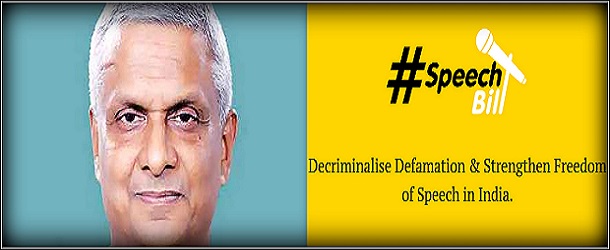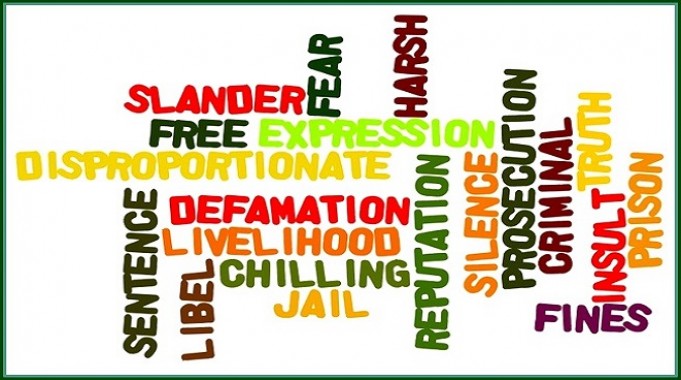A new effort to reform defamation
Tathagata Satpathy, a Member of Parliament elected to the Lok Sabha from Dhenkanal, Orissa, has launched a new effort to repeal criminal defamation and enact a law to codify civil defamation.
The Chief Whip for the Biju Janata Dal, Satpathy has been a professional journalist and a recent profile of him in the Mint mentions that he is the owner of leading Odia daily Dharitri and of the English daily Orissa Post. And yes, like many journalists in this country he’s been at the receiving end of defamation proceedings.
Over the course of the last year, Satpathy has been the poster boy for liberal causes, such as net neutrality, the legalisation of marijuana, and the decriminalisation of homosexuality and has also spoken out against the government’s handling of the JNU controversy.
Supported by the Internet Freedom Foundation and other organisations, Satpathy’s office has launched a rather slick advocacy campaign to build up support for the introduction of a private member’s bill titled “The Protection of Speech and Reputation Bill”. This effort has included outreach to the media and public personalities asking them for their support.

BJD MP Tathagatha Satpathy and a publicity graphc for the bill
The main platform of the advocacy effort is the website https://speechbill.in/ featuring a message from the MP, the core principles of the proposed Bill, a list of readings for each principle, FAQs and the option to express support for the Bill. The campaign also has a twitter handle @speechbillin.
The text of the Bill hasn’t yet been made available to the public on the grounds that his office isn’t clear whether parliamentary rules make it possible for him to do so but the Hoot has received a copy. Although private member’s bills rarely get through Parliament, it is good to see such an effort take off, regardless of its outcome. Satpathy’s office is currently seeking feedback from the general public and I believe there is an option to send feedback through the website mentioned above.
How about a White Paper to start with?
Before discussing the contents of the Bill, let’s first examine the advocacy effort. While it’s commendable that the MP’s office has put out a list of principles and essential readings that are guiding its effort, it would be very useful if they could first put out a White Paper which explains the background research undertaken by them and the link between their research and the provisions of the Bill.
All too often, we see legislation in Parliament where the government proclaims the holy truth without ever telling us how it divined such truth. A White Paper on the issue should explain the background research taken up by the Bill’s authors followed by a clause by clause explanation of why each provision has been drafted in the manner found in the Bill.
My point is that just reading the Bill or the principles listed on the website is not going to give the common man or even journalists a complete understanding of the problem. Most importantly, Satpathy should conduct this exercise before the Bill is introduced in Parliament rather than after. There is no parliamentary rule prohibiting such discussions and the two rules cited by his office as the reason for not making the bill publicly available, do not stop them from having a public discussion on the bill. The government often makes bills publicly available before introducing them in Parliament and there is no reason why a MP’s bill will not be given the same benefit.
The civil defamation provisions
The main focus of the proposed bill is codifying and reforming civil defamation law. (The simple solution mooted for criminal defamation law in this Bill is to simply revoke it entirely – not much to discuss there!) Currently civil defamation is governed by common law i.e. judge-made law. There is no parliamentary legislation governing defamation. In 1988, Rajiv Gandhi wanted to enact a defamation law but was forced to withdraw it after a backlash from the press. Satpathy’s bill attempts to codify existing norms and also squeeze in some radical reforms to civil defamation law.
All the reforms are very media friendly. A few of them are listed below:
- A mandatory legal notice requirement prior to filing the lawsuit which will require the person who plans to file the lawsuit to first issue a legal notice and give the defendant two weeks to take remedial action.
- Curbs are imposed on the ability of government servants to sue for civil defamation – they can sue for defamation only if they can show the statement is made in reckless disregard for the truth. This wording I guess is borrowed from the Autoshankar decision of the Supreme Court. These reforms are welcome because, as we’ve documented on the Hoot, public servants very often file civil defamation lawsuits and sometimes they win, as in the Zee TV case when damages of Rs. 20 lakhs were awarded to the police inspectors who were convicted for the fake encounters at Connaught Place in the capital. In other cases, the lawsuits drag on, sometimes for over 20 years.
- Governments, local authorities and other organs of the state are completely prohibited from suing for defamation.
- Also prohibited from filing defamation lawsuits are “an acquaintance, relative, friend in any capacity whatsoever” of the person against whom such a defamatory statement has been made. The legal test for determining acquaintance or friend is not clear.
- Only authors, editors and publishers may be sued as per Clause 10 of the Bill. The Bill defines author as “the first speaker of a statement, but does not include a person who did not intend that such statement be published”. The bill defines editors and publishers as per the declarations made under the Press and Registration of Books Act, 1867.
- Chapter IV of the Bill lays down safeguards to prevent multiple lawsuits for the same provision and Chapter V lays down defences in the case of defamation.
- Apart from truth which is the strongest defence to defamation, the Bill also proposes the defence of opinion and inference. This is mostly a codification of existing law in India.
- The Bill then also surprisingly grants “absolute privilege” to statements made not only in legislatures but also in “local authority or committees of local authority”. Legislatures enjoy privilege under the Constitution i.e. a member can’t be sued for anything said in the legislature. But then again, legislatures have internal checks to haul up members who make defamatory statements and breach the rules of the legislatures. Why extend the same privileges to “local authorities”?
- Chapter VI of the Bill deals with procedural issues and remedies. It allows the plaintiff to sue for defamation only where the defendant resides, carries on business or personally works for gain. This is a major reform because currently plaintiffs very often sue defendants in any court within whose jurisdictions the defamatory material is published. For a magazine or newspaper with a wide circulation, it means that they can be sued in any corner of the country. The proposed reform will ensure that the press can be sued only at the court having jurisdiction where the publication “resides, or carries on business, or personally works for gain’’.
- Chapter VI also deals with remedies – it provides plaintiffs with the remedy of injunctions and damages. The Bill prohibits punitive or exemplary damages and lays down a limit for damages at Rs. 50 lakhs in cases where there is no evidence of specific financial loss. It also lays down various principles to determine damages. The Bill also gives the court the right to order the defendants to carry out suitable corrections, publish apologies and corrections.
Lack of clarity on several provisions
With regard to the mandatory legal notice requirement, the Bill doesn’t prescribe an independent mechanism to vet the authenticity of the communications that are taking place through registered post or email. In the Indian litigation context that’s a serious problem and also the reason why we have such a cumbersome system of affidavits and verifications and notaries in civil litigation.
In the context of the bill the problem of verifying the authenticity of communications is all the more important since it bars legal remedies in case both parties can sort out the problem by replying to the notice.
As mentioned above, the Bill only allows the authors of the statement, the editor and the publisher to be sued. The two important exclusions from this list are journalists who reported the statement and the printers who print the paper or magazine on behalf of the publisher. Both journalists and printers are liable under the current law of defamation because they are participating in communicating the allegedly defamatory statement to the public. It is not clear why either of them is excluded from this bill. After all, if a printer has profited from the publication of defamatory content, he or she should be liable for damages.
The bill has a specific provision shielding internet intermediaries from liability in defamation cases. It is also not clear why this Bill is seeking to legislate with regard to the liability of internet intermediaries when Section 79 of the Information Technology Act already lays down safeguards which were further strengthened by the Supreme Court in the Shreya Singhal case. Such legislative overlaps are perhaps best avoided unless, of course, I’m missing out on something in the drafting of this provision.
As previously discussed, the jurisdictional clauses in the bill are very favourable to the press since it allows for the media to be sued only where they reside, carry on business or work. In most cases, this will likely mean that the media can only be sued at the court having jurisdiction over its registered office. While this saves the media the trouble of responding to lawsuits in random courts, it does make life unfair for those who have actually been defamed.
For example, if a person sitting in Madurai is defamed by a national media organisation in Noida, should the law really require that the suit be instituted in Noida? (Let’s not forget that a good portion of the electronic news media resides in Film City, Noida, Uttar Pradesh).
While this bill by Satpathy is a welcome effort, one does wonder whether we can talk about diluting civil defamation law without also talking about increasing media accountability.
Given the present state of the Indian media, I don’t think too many people are going to support diluting defamation laws in this country. Maybe it is also time to take a relook the working of the Press Council of India?
